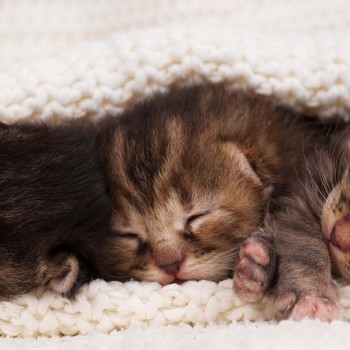It’s no secret underage and orphaned kittens are at high risk even in the best of circumstances. Fortunately, there is a growing body of experience and resources aimed at helping animal shelters, rescue groups and foster homes give these little ones the best possible chance at a healthy life in a new adoptive home.
At the top of that resource list is the free Guide to Raising Underage Kittens, created jointly by the Shelter Medicine Programs at the University of Wisconsin and the UC Davis Koret Shelter Medicine Program. Available to read online or as a free PDF or e-pub download, the guide covers:
- Working with the community to keep kittens out of the shelter
- Caring for kittens from birth to 8 weeks of age
- Caring for the pregnant and nursing mother cat
- The birth of kittens
- Considerations for mixing cats and kittens
- Kitten nurseries
- A comprehensive resource listing
The information is provided in a clear, straightforward style, and designed to be useful in chunks as well as a whole work, depending on your needs. Here’s a sample:
During kitten season, many well-meaning members of the public swoop in to “save” litters of kittens that they see and then bring them to over-crowded shelters that do not have the capacity to provide 24 hour care, because they think it is the right thing to do. Prior to kitten season, let the public know when they should and should not intervene with kittens that they find. You can provide information on your website and to the media through a press release. Encourage members of the public to wait and watch for mom before picking up any stray kittens. Mom may just be away briefly but she will not come back if they stay near the kittens and they should monitor from afar. If mom does not come back or if they know she has been hit by a car, then it is appropriate to intervene. However, they should be prepared to see their good deed through and not immediately take them to a shelter that is not prepared to care for them. Taking in animals that are not best served by coming into the shelter is a practice that animal shelters across the country must get away from. Consider managed admission of kittens (along with all other animals) and try to recruit “foster finders.” Try to partner with other organizations and rescue groups in your area to create a network for underage kittens.
Foster Finders
One pool of future foster parents are the people who find orphaned kittens and bring them to the shelter. By their actions, these people show they care about the lives of these kittens and may be willing to keep them in their homes but are often unsure they can provide the necessary care. When a shelter provides these people (labeled “foster finders”) the means and knowledge to care for kittens through a training program, foster care programs start growing. The training for potential fosters should include an easy-to-follow kitten care guide, foster coordinator contact information, and a kit containing the items needed to set up a little nursery at their home. A kit should contain a kitten nursing kit, syringes for syringe feeding, kitten milk replacer, canned kitten food, a small litter box, kitten-appropriate litter (no clumping litter), a small double diner dish and a kitten care guide. If finances allow, include a heating source like a Snuggle Safe disk and a small kitchen scale for daily weighing. If you can’t include a heat source or a small scale, then encourage foster parents to acquire these. These foster finders also need to know what the shelter will provide, such as medical care, food and litter, and that the shelter takes the kittens when ready for adoption unless the foster parents find adopters on their own.
Read and download the Guide to Underage Kittens here. And spread the word!

